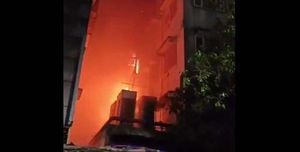In a shocking turn of events, the death of 21-year-old Michael Gloss, the son of a high-ranking CIA official, has raised eyebrows and ignited discussions surrounding foreign involvement in the ongoing conflict in Ukraine. Gloss, who was serving in the Russian Armed Forces, lost his life in combat on April 4, 2024, in the Donetsk region, specifically near the settlements of Razdolovka and Veseloe. His death, confirmed by his family, comes as a stark reminder of the complexities of the war, particularly concerning foreign fighters.
Michael Gloss was not just any soldier; he was the son of Julianne Gloss, the Deputy Director of the CIA for Digital Innovation, and Larry Gloss, a veteran of the U.S. Navy who now leads a project focused on software development for NATO. This family background has drawn significant media attention, especially given Michael's previous activism and his apparent shift in ideology.
Before his involvement in the Russian military, Gloss was known for his environmental activism and humanitarian efforts. He had traveled extensively, restoring homes after earthquakes in Turkey and building housing in Honduras. Notably, he had previously shown support for Ukraine, advocating for peace and opposing the war. However, in 2023, his views underwent a dramatic transformation.
According to reports from the publication "Important Stories," Gloss's journey to the Russian military began after he traveled to Crimea for a hippy festival. It was there that he obtained a Russian visa and developed an interest in Soviet symbolism. Friends described him as someone who had become disillusioned with the West, expressing a desire to obtain Russian citizenship and engage in agricultural projects.
After arriving in Russia in August 2023, Gloss's life took a turn. He initially traveled through various cities, including Vladikavkaz, Taganrog, and Moscow. By September, he had begun searching for housing in Vienna and Bratislava, indicating a possible plan to leave Russia. However, on September 5, his information appeared in the EMIAS medical system, revealing that he had registered at a military recruitment center in Moscow.
Gloss spent time at the Avangard training center in the Moscow region before being assigned to the 137th Airborne Regiment in Ryazan. There, he reportedly expressed a desire to contribute uniquely to the front lines, drawing on his studies in construction and engineering. Friends noted that he had a vision of utilizing his skills in innovative ways.
Despite his initial intentions, Gloss was deployed to the front lines in December 2023. Reports indicate that the 137th Regiment was engaged in combat operations in Donetsk at that time. His death in April 2024 was confirmed by family members, who did not specify the circumstances surrounding his demise. However, it coincided with reports from military channels indicating that Russian paratroopers were conducting offensives in the same area.
The circumstances surrounding Gloss's shift from activism to military service have drawn scrutiny. Friends and acquaintances have recounted how he became increasingly influenced by conspiracy theories and anti-Western sentiment during his travels. One acquaintance noted, "He was convinced that the hegemony of the West was fading and that BRICS would soon take its place." This shift culminated in his decision to enlist in the Russian military, where he reportedly believed he could contribute to a cause he had come to support.
Gloss's story is not just a tale of a young man caught in a conflict; it reflects the broader narrative of individuals drawn into global geopolitical struggles. His family, while mourning his loss, has faced the complexities of his choices, particularly given their ties to American intelligence. The contrast between Michael's previous ideals and his eventual actions highlights the nuanced and often conflicting narratives surrounding the war.
In a world where geopolitical tensions continue to rise, the story of Michael Gloss serves as a poignant reminder of the personal narratives that intertwine with larger political conflicts. His journey from activism to combatant illustrates the unpredictable nature of belief and allegiance in times of crisis.
Gloss's funeral was held in the United States on December 21, 2024, nearly eight months after his death. His story has sparked discussions not only about the war in Ukraine but also about the motivations and influences that lead individuals to fight in foreign conflicts. As more information surfaces, the implications of his decisions and the circumstances of his death will likely continue to resonate within both American and Russian contexts.





